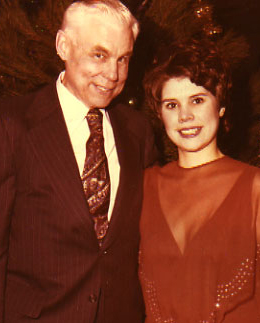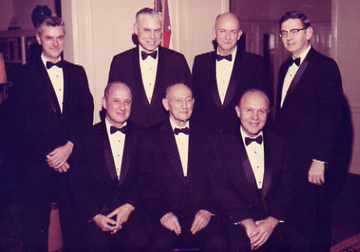Conservationist
“You say timbER, I say timbRE.”
—Linda Lane Smith
“When you think of the Yale School of forestry, David T. Mason, and my father, Richard F. ‘Dick’ Smith, it should conjure up a picture of one of our world’s most essential resources: Forests!”
Linda Lane Smith has clearly inherited her father’s sound principles of “sustained yield forestry.” “Having grown up in the beautiful Pacific Northwest, conservation and the rightful management of forests pulses in my veins as much as any aria I’ve ever sung. I wouldn’t be the artist I am today without the lessons I’'ve learned from the forest’s understory. I have incorporated so many of the principles that apply to sustained yield forestry management into my professional and personal life. The trees are as much a part of me as is my gift of singing.”
“David T. Mason emerged as one of the nation’s leading voices in forestry issues and practices. In 1952, Frderick K. Weyerhaeuser, an American timber industry magnate, would say this of David T. Mason: ‘No single person has been more influential in promoting sound forest management on private forestlands than he.’“
“David T. Mason was my father’s mentor after my father graduated from the University of Washington with a degree in Science (Forest Management). David T. Mason invited my father to join the prestiguious firm of Mason, Bruce and Girard, which is still thriving today and has expanded its scope of causes. My father championed those causes in his own forest and in the forests of his many clients.”
Linda Lane was steeped in her father’s principles of “sustained yield forestry” at an early age, which is why she is still so passionate about it today.
Sustained yield forestry is a SCIENCE and an ART. Singing is an ART and SCIENCE. Both forestry and singing balance the biological and economical truths of managing natural resources.
In Forestry, the sustained yield forestry practice yields an abundance of products while forest owners realize substantial economic return on their investment, and still have a beautiful forest to enjoy.
Good voice training is based on those same biological and economic truths. A singer must learn how to produce a vocal sound, using no sound enhancement, thru the fragile vocal apparatus so as to resonate to each member of a 3,000 plus audience without doing vocal chord harm. If done correctly, a singer can successfully sing their entire lives.
Sound “timbRE” and “timbER” management can result in abundant returns on both natural resources.
Linda Lane is lending her considerable singing talents and passion for conservation of natural resources by launching A Voice in the Forest — a multi-media presentation consisting of song, narration and visuals.
“I am encouraged by the focus, of late, on the preservation of ALL natural resources. Al Gore’s film An Inconvenient Truth is a good beginning. A Voice in the Forest is what I can and must do.”
For more information, or to book Ms. Smith’s A Voice in the Forest, please e-mail avoiceintheforest@msn.com.
And this our life, exempt from
Public haunt, finds tongues in trees, books in
The running brooks
Sermons in stones, and good in everything.
—William Shakespeare
 Linda Lane with her father, Richard “Dick” Smith.
Linda Lane with her father, Richard “Dick” Smith.
 At a dinner honoring David T. Mason. Pictured (standing) Robert J. Knepper, Richard F. Smith, Gwynne H. Sharrer, Carl A. Newport; (seated) Lucien B. Alexander, David T. Mason, Gilbert M. Bowe. December 11, 1968.
At a dinner honoring David T. Mason. Pictured (standing) Robert J. Knepper, Richard F. Smith, Gwynne H. Sharrer, Carl A. Newport; (seated) Lucien B. Alexander, David T. Mason, Gilbert M. Bowe. December 11, 1968.